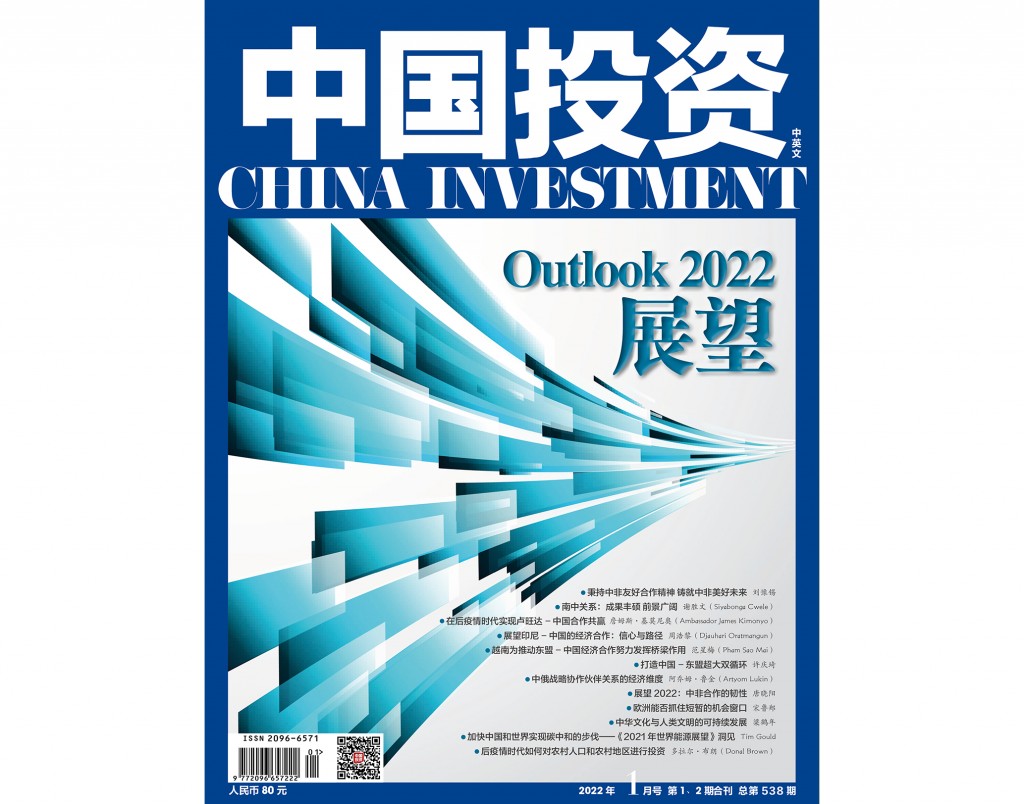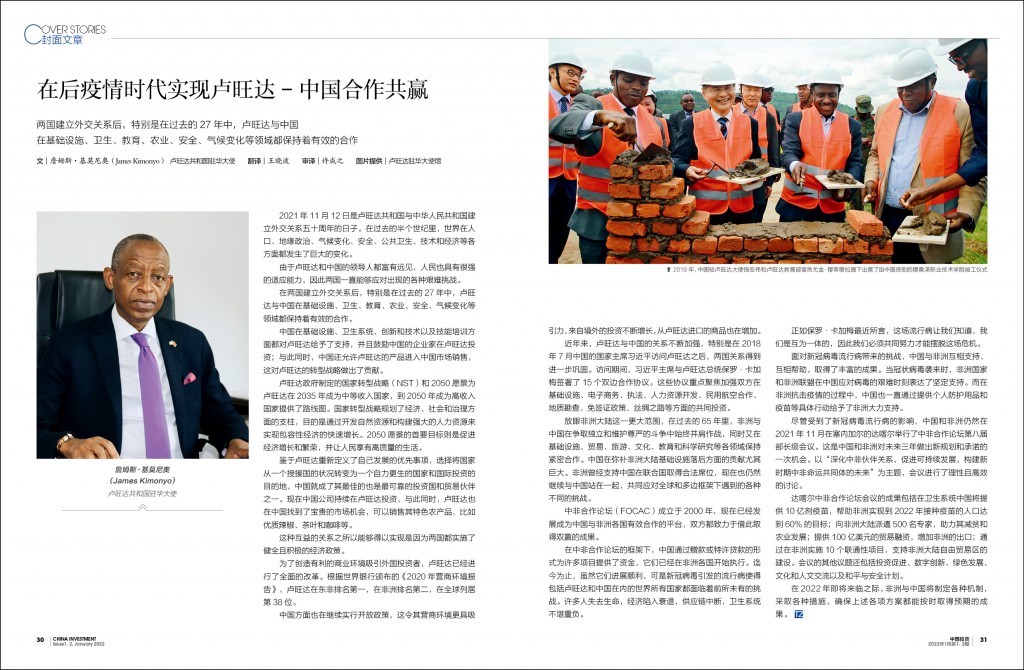
2022展望
By H.E. James Kimonyo,Ambassador of the Republic of Rwanda to China
文|詹姆斯·基莫尼奥(James Kimonyo) 卢旺达共和国驻华大使
导读
Towards a Win-Win Rwanda-China Cooperation in the post COVID-19 era
12 November 2021, marked the 50th anniversary of the establishment of diplomatic relations between the Republic of Rwanda and the People’s Republic of China. This past half century has been characterized by enormous changes in the world, whether it is about demographics, geopolitics, climate change, security, public health, technology and the economy.
Based on visionary leadership of the two countries and resilience of our two peoples, Rwanda and China have been able to tackle formidable challenges.
⬆ Chinese Ambassador to Rwanda Rao Hongwei and Rwanda Ministry of Education Hon. Eugene Mutimura attended the ceremony of China-aided Musanze Vocational and Technical College in Rwanda, 2019.
Throughout this journey of the diplomatic relations especially in the last twenty-seven years, Rwanda and China have maintained effective cooperation in the areas of infrastructure, health, education, agriculture, security, climate change, etc.
China’s support in infrastructure, health systems, innovation and technology, skills development, encouraging Chinese entrepreneurs to invest in Rwanda and allowing Rwandan products to be sold to the Chinese market has contributed to Rwanda’s transformation.
The National Strategy for Transformation (NST) and Vision 2050 provide a roadmap to make Rwanda a middle-income country by 2035 and a high-income nation by 2050. The National Strategy for Transformation (NST) is built on economic, social and governance pillars, with the aim of accelerating inclusive economic growth and development through the exploitation of our natural capital as well as building a strong human capital base. Whereas Vision 2050 has overarching objectives of promoting Economic Growth and Prosperity and High Quality of life.
As Rwanda redefines her priorities, choosing to turn from an aid recipient country into a self-reliant nation and international investment destination, China has become one of her best and reliable investment and trade partner. Chinese companies continue to invest in Rwanda, while at the same time Rwanda has found valuable market opportunities in China by supplying specialty agricultural commodities such as high-quality chili, tea and coffee.
This beneficial relationship has been made possible by sound and positive economic policies implemented by the two countries.
Rwanda has undertaken extensive reforms to create a conducive business environment to attract foreign investors. Today, Rwanda is ranked number one in East Africa, number two in Africa and thirty-eighth globally according to the World Bank Doing Business Report of 2020.
On its part, China has continued its opening up policy, which has created an attractive business environment resulting in increased outbound investments and the growth of import of Rwandan products.
The relationship between Rwanda and China has been continuously reinforced over the years and was further cemented with the visit of H.E Xi Jinping, President of the People’s Republic of China in July 2018, during which together he signed 15 bilateral cooperation agreements with his counterpart H.E Paul Kagame, President of the Republic of Rwanda. The agreements signed during this visit focused on strengthening mutual investment in infrastructure, e-commerce, law enforcement, human resource development, civil air transport cooperation, geological survey, visa exemption policy, silk road, among others.
In the context of the wider African continent, over the past 65 years, Africa and China fought shoulder to shoulder in the struggle to win independence, uphold dignity and embarked on a distinct path of cooperation in various fields such as infrastructure, trade, tourism, culture, education and scientific research, etc. China has particularly greatly contributed to bridge the infrastructure gap on industrial development in the African continent. Africa supported China to take its lawful seat at the United Nations and continues to work together on different global challenges and multilateral framework.
Founded in 2000, the China Africa Cooperation (FOCAC) has since become an effective platform for cooperation and exchange between China and African countries and both sides strive to achieve on win-win outcomes.
Under FOCAC, many projects have been implemented in different African countries funded by China through grant or concession loans. Despite the good progress made so far, all the nations in the world including Rwanda and China have faced unprecedented challenges brought by the COVID-19 pandemic. Lives have been lost, economies fall into recession, supply chain disrupted and health systems overwhelmed.
As H.E Paul Kagame said recently, this pandemic has reminded us that we are interconnected, we therefore have to work together to get out of this crisis.
The joint response of China and Africa to the COVID-19 pandemic challenge through mutual support and assistance is baring fruits. When COVID-19 struck, African countries and the African Union gave China firm support at a tough time during its fight against the virus. China has also been strong in supporting Africa in the fight against the pandemic with concrete actions like providing PPEs and vaccines.
Despite the impact of the COVID-19 pandemic, China and Africa were able to hold the Eighth Ministerial Conference of the Forum on China-Africa Cooperation (FOCAC) that took place in November 2021 in Dakar, Senegal. This was yet another opportunity for China and Africa to make new commitments for the next 3 years. The conference carriedout rational and efficient discussions under the theme “Deepen China-Africa Partnership and Promote Sustainable Development to Build a China-Africa Community with a Shared Future in the New Era.”
The outcome of the FOCAC meeting in Dakar, include China’s support in the health sector by providing one billion vaccine dozes to help Africa reach its target of vaccinating 60% of the African population by 2022, the poverty reduction and agricultural development programme by sending 500 experts to the continent, 10 billion USD of trade financing to increase African exports, support Africa Continental Free Trade Area by implementing 10 connectivity projects for Africa. Other areas include the investment promotion, the digital innovation, the green development, cultural and people-to-people exchange, and peace and security program.
As we begin the year 2022, Africa and China will put in place instruments and mechanisms to ensure that the above-mentioned programs will generate the intended outcomes in a timely manner.
2021年11月12日是卢旺达共和国与中华人民共和国建立外交关系五十周年的日子。在过去的半个世纪里,世界在人口、地缘政治、气候变化、安全、公共卫生、技术和经济等各方面都发生了巨大的变化。
由于卢旺达和中国的领导人都富有远见,人民也具有很强的适应能力,因此两国一直能够应对出现的各种艰难挑战。
在两国建立外交关系后,特别是在过去的27年中,卢旺达与中国在基础设施、卫生、教育、农业、安全、气候变化等领域都保持着有效的合作。
⬆ 2019年,中国驻卢旺达大使饶宏伟和卢旺达教育部官员尤金·穆蒂穆拉阁下出席了由中国资助的穆桑泽职业技术学院竣工仪式)
中国在基础设施、卫生系统、创新和技术以及技能培训方面都对卢旺达给予了支持,并且鼓励中国的企业家在卢旺达投资;与此同时,中国还允许卢旺达的产品进入中国市场销售,这对卢旺达的转型战略做出了贡献。
卢旺达政府制定的国家转型战略(NST)和2050愿景为卢旺达在2035年成为中等收入国家,到2050年成为高收入国家提供了路线图。国家转型战略规划了经济、社会和治理方面的支柱,目的是通过开发自然资源和构建强大的人力资源来实现包容性经济的快速增长。2050愿景的首要目标则是促进经济增长和繁荣,并让人民享有高质量的生活。
鉴于卢旺达重新定义了自己发展的优先事项,选择将国家从一个授援国的状况转变为一个自力更生的国家和国际投资的目的地,中国就成了其最佳的也是最可靠的投资国和贸易伙伴之一。现在中国公司持续在卢旺达投资,与此同时,卢旺达也在中国找到了宝贵的市场机会,可以销售其特色农产品,比如优质辣椒、茶叶和咖啡等。
这种互益的关系之所以能够得以实现是因为两国都实施了健全且积极的经济政策。
为了创造有利的商业环境吸引外国投资者,卢旺达已经进行了全面的改革。根据世界银行颁布的《2020年营商环境报告》,卢旺达在东非排名第一,在非洲排名第二,在全球列居第38位。
中国方面也在继续实行开放政策,这令其营商环境更具吸引力,来自境外的投资不断增长,从卢旺达进口的商品也在增加。
近年来,卢旺达与中国的关系不断加强,特别是在2018年7月中国的国家主席习近平访问卢旺达之后,两国关系得到进一步巩固。访问期间,习近平主席与卢旺达总统保罗·卡加梅签署了15个双边合作协议。这些协议重点聚焦加强双方在基础设施、电子商务、执法、人力资源开发、民用航空合作、地质勘查、免签证政策、丝绸之路等方面的共同投资。
放眼非洲大陆这一更大范围,在过去的65年里,非洲与中国在争取独立和维护尊严的斗争中始终并肩作战,同时又在基础设施、贸易、旅游、文化、教育和科学研究等各领域保持紧密合作。中国在弥补非洲大陆基础设施落后方面的贡献尤其巨大。非洲曾经支持中国在联合国取得合法席位,现在也仍然继续与中国站在一起,共同应对全球和多边框架下遇到的各种不同的挑战。
中非合作论坛(FOCAC)成立于2000年,现在已经发展成为中国与非洲各国有效合作的平台,双方都致力于借此取得双赢的成果。
在中非合作论坛的框架下,中国通过赠款或特许贷款的形式为许多项目提供了资金,它们已经在非洲各国开始执行。迄今为止,虽然它们进展顺利,可是新冠病毒引发的流行病使得包括卢旺达和中国在内的世界所有国家都面临着前所未有的挑战。许多人失去生命,经济陷入衰退,供应链中断,卫生系统不堪重负。
正如保罗·卡加梅最近所言,这场流行病让我们知道,我们是互为一体的,因此我们必须共同努力才能摆脱这场危机。
面对新冠病毒流行病带来的挑战,中国与非洲互相支持、互相帮助,取得了丰富的成果。当冠状病毒袭来时,非洲国家和非洲联盟在中国应对病毒的艰难时刻表达了坚定支持。而在非洲抗击疫情的过程中,中国也一直通过提供个人防护用品和疫苗等具体行动给予了非洲大力支持。
尽管受到了新冠病毒流行病的影响,中国和非洲仍然在2021年11月在塞内加尔的达喀尔举行了中非合作论坛第八届部长级会议。这是中国和非洲对未来三年做出新规划和承诺的一次机会。以“深化中非伙伴关系,促进可持续发展,构建新时期中非命运共同体的未来”为主题,会议进行了理性且高效的讨论。
达喀尔中非合作论坛会议的成果包括在卫生系统中国将提供10亿剂疫苗,帮助非洲实现到2022年接种疫苗的人口达到60%的目标;向非洲大陆派遣500名专家,助力其减贫和农业发展;提供100亿美元的贸易融资,增加非洲的出口;通过在非洲实施10个联通性项目,支持非洲大陆自由贸易区的建设。会议的其他议题还包括投资促进、数字创新、绿色发展、文化和人文交流以及和平与安全计划。
在2022年即将来临之际,非洲与中国将制定各种机制,采取各种措施,确保上述各项方案都能按时取得预期的成果。
编辑 | 伊 南
翻译 | 王晓波
审译 | 许成之
校对 | 闫建军
设计 | 大 米




